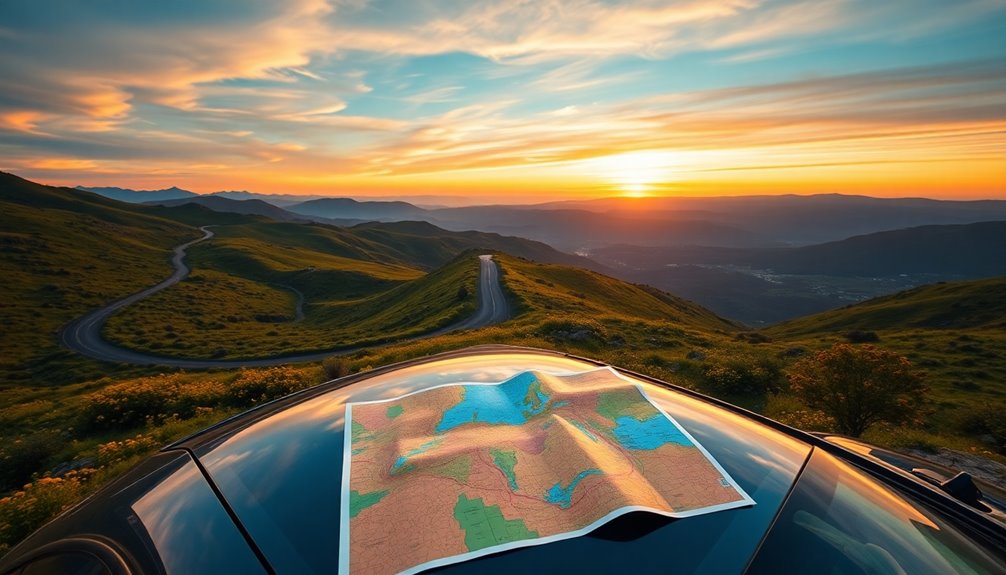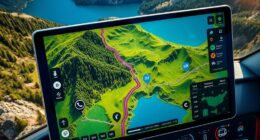You won't believe how easy road trip planning can be when you break your journey into weekly segments! It transforms long trips into manageable adventures. You can distribute travel distances evenly, explore unique attractions, and engage in fun activities along the way. Plus, you can adjust your plans on-the-fly to suit your family's enjoyment. With the right endpoints and a solid plan, trip memories will be unforgettable. Stick around to uncover more tips for smooth travels!
Key Takeaways
- Break your trip into weekly segments to manage distances and create enjoyable milestones along the route.
- Use local event calendars to discover unique activities that enhance your itinerary and family bonding.
- Incorporate one major activity each day to maintain balance and ensure memorable experiences.
- Keep physical maps handy to navigate confidently, especially when GPS fails.
- Prepare your vehicle and pack essentials to ensure a safe and smooth journey.
The Benefits of Breaking Your Journey Into Weekly Segments

When you break your journey into weekly segments, you can transform a challenging road trip into a manageable adventure. This approach allows for a flexible planning style, ensuring your travel schedule doesn't feel overwhelming.
By distributing travel distances evenly, each day becomes enjoyable rather than rushed or exhausting. You'll find that setting weekly endpoints gives you clear milestones to look forward to, enhancing memory retention of trip highlights.
Prioritizing enjoyable locations for longer stays means you can engage in activities, leading to richer experiences for everyone involved. Plus, with this method, you can easily adjust plans based on your family's enjoyment or any unexpected opportunities that arise, making your road trip even more memorable. Additionally, incorporating essential oils for respiratory health can enhance your overall travel comfort by helping to alleviate any congestion you may experience along the way.
Choosing Your Endpoints: How to Select Perfect Stops

- Balance Travel Distances: Aim to distribute your travel distances evenly to reduce fatigue and allow for exploration.
- Prioritize Attractions: Choose unique endpoints like national parks or historic sites, ensuring there's something for everyone to enjoy.
- Plan Longer Stays: In areas with more attractions and local experiences, consider longer stays to fully embrace the destination. For instance, a cruise to the Mexican Riviera can offer cultural tours and beautiful beaches, making it a perfect endpoint for relaxation.
Planning Activities for Each Week: Making Memories

To create lasting memories on your road trip, planning activities for each week is essential. A structured itinerary helps you balance sightseeing, relaxation, and family bonding time.
Incorporate one major activity each day, like visiting a museum or going on an outdoor adventure, to keep the schedule enjoyable and manageable. Set weekly endpoints based on geography and desired activities to evenly disperse driving distances, making your journey less stressful.
Don't forget to utilize local event calendars and resources like Airbnb Experiences for unique opportunities that match your interests. Additionally, consider planning outdoor adventures that include skills like foraging for food or finding clean water in the wilderness to enhance your trip's excitement and connection to nature.
Finally, keep a journal documenting weekly highlights to reflect on positive memories and create a treasured keepsake that captures the essence of your journey.
Budgeting for a Weekly Road Trip: Managing Costs Effectively
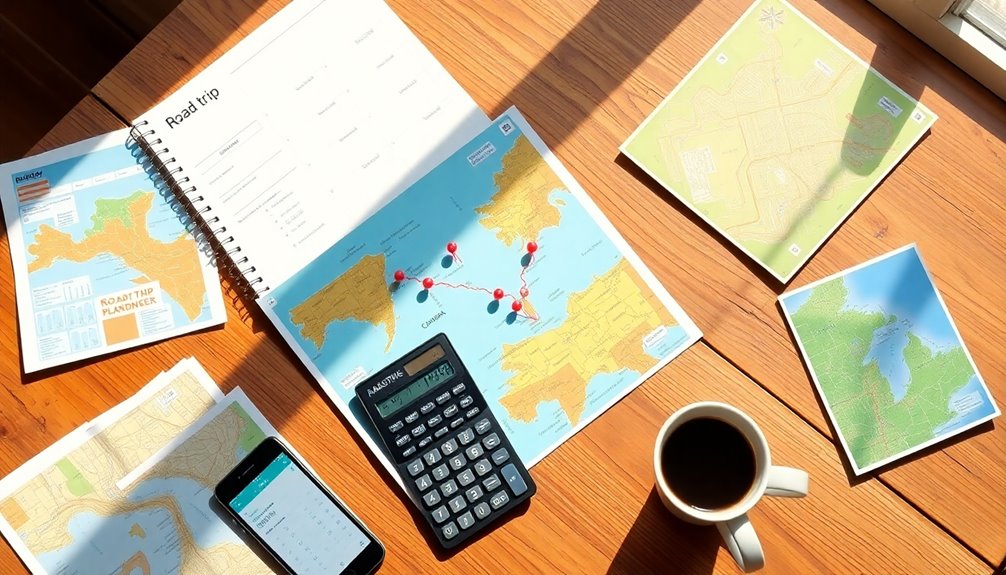
When planning your weekly road trip, it's essential to keep a close eye on your budget.
Start by estimating gas costs based on mileage and your vehicle's MPG, then factor in accommodation and meal expenses to avoid surprises. Additionally, consider budgeting for unexpected expenses that may arise during your trip, such as tolls or attraction fees.
Estimating Gas Expenses
Estimating gas expenses for your road trip can be straightforward if you follow a few simple steps.
Here's how to get a clear picture of your fuel costs:
- Calculate total mileage: Map out your route to determine the distance you'll cover.
- Determine average miles per gallon (MPG): Check your vehicle's specifications for its fuel efficiency.
- Estimate gas prices: Use an app to track current gas prices along your route.
Once you have these figures, divide your total mileage by your average MPG to find the gallons needed.
Then, multiply that number by the average gas price to estimate your total fuel costs.
Don't forget to account for any detours that could increase both mileage and expenses!
Accommodation Budgeting Tips
Finding the right balance between comfort and cost is key to effective accommodation budgeting on a weekly road trip. Aim for budget lodging options, which typically range from $50 to $60 per night, totaling around $350 to $420 for the week.
For longer trips, consider renting a property; this can provide extra space and a kitchen, saving on meal costs. Campsites are another affordable choice, averaging $20 per night, with many free options available.
Don't forget about travel hacking—using loyalty programs with hotels like Choice Hotels can help you score free stays.
Finally, weigh the benefits of central versus distant accommodations, as staying closer to attractions can save you time and transportation costs, enhancing your overall trip experience.
Meal Cost Management
After securing your accommodations, the next step is managing meal costs effectively during your road trip. For successful meal cost management, consider these tips:
- Budget Wisely: Allocate around 30% of your daily travel budget for meals, allowing for one sit-down dining out experience and plenty of snacks and drinks.
- Shop Smart: Visit local grocery stores to stock up on snacks and ingredients for easy meals. This can save you significant money compared to fast food.
- Plan Ahead: Prepare some meals in advance or pack ready-to-eat items. Aim to spend about $5-10 per person daily on snacks and drinks to keep your energy up without breaking the bank. Additionally, consider the importance of long-term financial planning to ensure you can afford enjoyable meals while traveling.
Navigating With Ease: Tips for a Smooth Journey
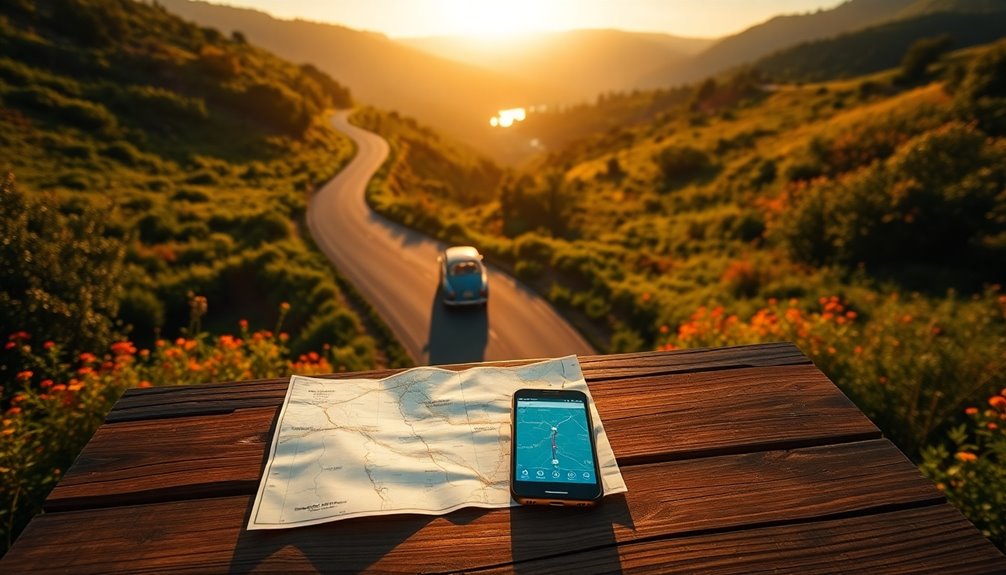
When you're on the road, steering with ease can make all the difference. You'll want to sharpen your map reading skills and keep physical maps handy for those times when GPS isn't reliable. Quick steering tips, like using Post-it notes for daily routes, can help you stay focused on the journey ahead. Additionally, embracing the spirit of adventure on the open road can lead to discovering unforgettable experiences along your travels.
Effective Map Reading Skills
Mastering map reading skills is essential for any road trip enthusiast looking to navigate with confidence. Turning off your GPS can help you develop these critical skills.
Here are three tips to improve your map reading abilities:
- Practice with a printed map: This allows you to see a broader area, helping you spot alternative routes and scenic detours.
- Familiarize yourself with map symbols: Understanding legends lets you quickly interpret routes and landmarks.
- Regularly practice navigation: This enhances your directional skills, making it easier to find your way in unfamiliar territory. Additionally, mastering paint sprayer techniques can improve your home project efficiency when you return from your trip.
Quick Navigation Tips
How can you make your road trip navigation smoother and more enjoyable? Start by consulting an Adventure Atlas each morning for effective route planning. This helps you understand your destination clearly.
Use Post-it notes to outline daily routes, placing them on your dashboard for quick access to key navigation points. Stick to your navigation notes to stay focused on the road—this way, you won't need to constantly check your maps.
To enhance your map reading skills, consider turning off GPS during certain stretches. This practice boosts your confidence and sense of direction.
Utilizing Physical Maps
While digital navigation tools can be convenient, utilizing physical maps can greatly enhance your road trip experience. Engaging with traditional maps boosts your sense of direction and confidence, especially in remote areas where GPS might fail.
Here are three tips for incorporating physical maps into your road trip planning:
- Practice with an Adventure Atlas each morning to familiarize yourself with your daily routes.
- Use Post-it notes on your dashboard to highlight key waypoints for quick reference on the go.
- Keep multiple physical maps handy, especially for backcountry roads, so you're never left without navigation options.
Preparing Your Vehicle for Weekly Adventures
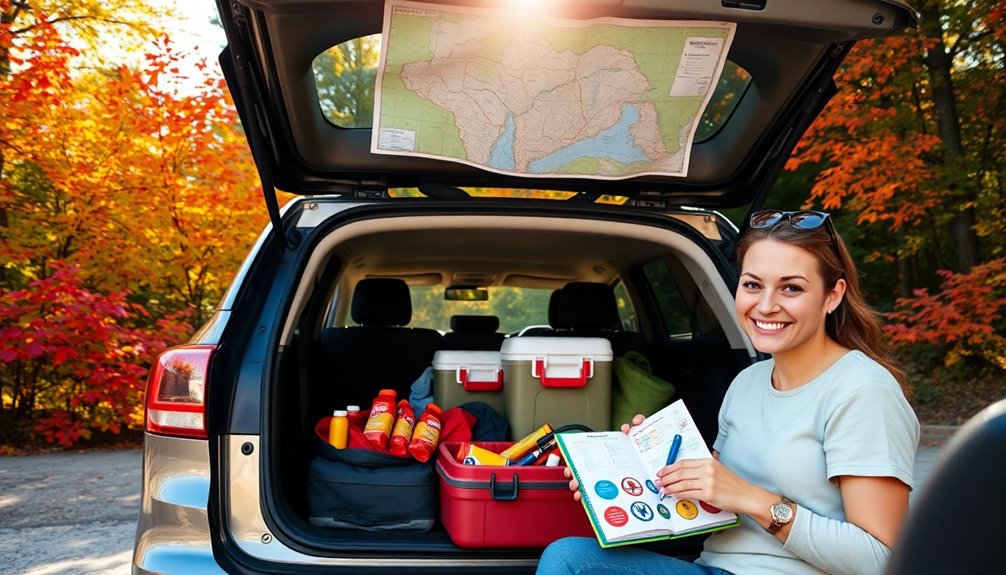
Preparing your vehicle for weekly adventures is essential for a smooth and enjoyable trip. Start with thorough vehicle maintenance, including oil changes and tire inspections. Use the penny test to check tire tread and guarantee all tires, including the spare, are properly inflated. This boosts safety and fuel efficiency. Don't forget to pack an emergency kit stocked with a flashlight, jumper cables, and basic tools, ready for any unexpected situations. Share your travel plans with a trusted friend or family member, detailing your route and stops for added safety. Finally, stay informed about road conditions and weather forecasts along your journey to adapt your plans as needed. This preparation sets the stage for countless adventures ahead! Additionally, it's wise to ensure that your vehicle has proper venting and anchoring systems to prevent any hazards during your travels.
Packing Essentials for a Flexible Road Trip
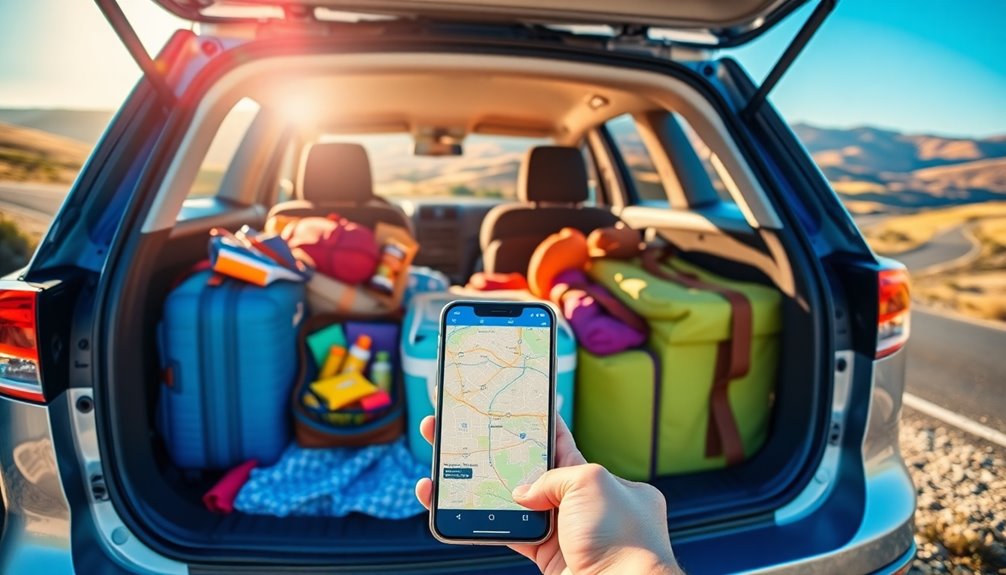
When planning a flexible road trip, packing the right essentials can make all the difference in your comfort and enjoyment.
Here's a quick list to help you stay prepared:
- Travel Documents: Always carry your ID, insurance, and reservation confirmations to avoid complications.
- Healthy Snacks: Stock up on granola bars and fruits, and consider bringing an Aeropress for fresh coffee on the go.
- Entertainment Options: Load up your devices with books, podcasts, and music playlists to keep everyone engaged during long drives.
Don't forget a first aid kit for emergencies and a portable charger for your devices.
Staying hydrated and well-fed in a small cooler will guarantee you're ready for whatever the road throws your way! Also, ensure you have the right beach towels for any stops at the coast to maximize your comfort and enjoyment.
Encouraging Family Bonding Through Shared Experiences

Packing your essentials sets the stage for an unforgettable journey, but it's the shared experiences that truly bring families closer together on the road. Engage in activities like exploring national parks or visiting quirky roadside attractions; these moments create lasting memories and strengthen family bonding.
During road trip planning, incorporate family-oriented games like car bingo or storytelling sessions to enhance interaction and keep everyone connected. Don't overlook meaningful conversations during meals or breaks—these discussions deepen relationships and help you understand each other better.
Consider participating in local classes as a family to foster teamwork. Finally, keep a trip journal where everyone can jot down thoughts and highlights, promoting reflection and connection for a more enriching experience. Additionally, maintain a focus on children's well-being to ensure that every family member feels valued and included during your adventures.
Frequently Asked Questions
How Can I Make My Travel Planning Easier?
To make your travel planning easier, break your trip into one-week increments. This keeps your plans manageable and flexible.
Use an online travel planner or app to track your itinerary, accommodations, and activities. Create a tailored packing list with versatile items to simplify packing.
Set weekly endpoints based on travel distance, and check local community calendars for events. This way, you'll have spontaneous, enriching experiences while enjoying a balanced travel schedule.
What Is the 21 Questions Road Trip Game?
The 21 Questions Road Trip Game is a fun way to connect, engage, and entertain.
In this game, one of you thinks of a person, place, or thing. Then, the others ask up to 21 yes-or-no questions to guess what it is.
You'll spark conversations, ignite creativity, and challenge your critical thinking.
It's adaptable for all ages and interests, making it perfect for families, friends, or even solo travelers seeking some fun on the road.
What Are the First 3 Steps to Planning a Road Trip?
To start planning your road trip, first determine your destination and outline a broad route that includes interesting stops and scenic drives, avoiding just the interstate.
Next, create a travel planner using an app like Evernote to save places of interest and organize your itinerary.
Finally, limit your daily driving to about four hours, giving yourself plenty of time to explore and enjoy the journey without feeling rushed.
When Driving on Long Road Trips How Often Should You Plan to Stop and Take a Break?
Driving non-stop for days may feel like an Olympic feat, but it's essential to take breaks.
Plan to stop every 2-3 hours during long road trips. These brief pauses, lasting 15-30 minutes, help you stretch, hydrate, and recharge your mind.
If you're traveling with family, factor in time for kids to play. Stopping for meals and scenic viewpoints can turn a long drive into a memorable adventure, making the journey enjoyable for everyone.
Conclusion
By breaking your road trip into weekly segments, you’ll not only ease the planning process but create lasting memories. Imagine a family who, instead of rushing through a long drive, takes a leisurely week to explore national parks. They hike, camp, and bond over campfire stories, transforming their journey into an adventure. So, grab your map, choose your stops, and get ready for unforgettable experiences on the road—it’s easier than you think! As you meander through picturesque landscapes, you’ll encounter charming towns and meet fellow travelers, each with their own amazing road trip stories shared around cozy diners or campgrounds. These interactions enrich your journey, adding layers to your experience that you won’t find in any travel guide. Each stop becomes a treasure trove of memories, ensuring that the road trip is not just about reaching a destination, but about embracing the journey itself.
